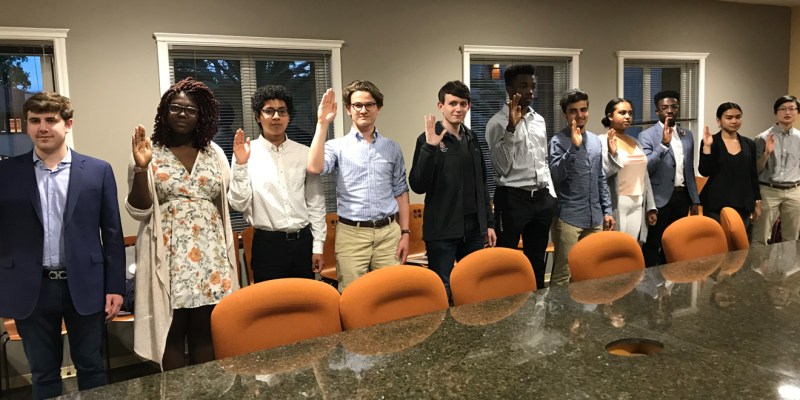In its 28th and final meeting on Tuesday night, the 19th Undergraduate Senate certified the Twenty-One, Twenty-Fun slate as sophomore class presidents and Matt Wigler ’18 as the final member of the incoming Senate.
The sophomore class presidency had been vacant for 11 days after the election, following an investigation of alleged campaign violations.
Though the ASSU Elections Commission did not reveal the specifics of the investigation, one slate, FOREVER ’21, was alleged to have hosted a party that included alcoholic beverages: a violation of the law, University policy and ASSU regulations that likely would have disqualified them from the race.
The slate dropped out of the race before the results were announced.
Although Twenty-One, Twenty-Fun was also accused by the Fountain Hopper, an anonymous campus e-newsletter, of exceeding the campaign spending limit, Presidents-elect Celine Foster ’21, Brian Chan ’21, Johnathan Bridges ’21 and N’Naserri Carew-Johnson ’21 denied that they were ever under investigation, aside from the standard financial audit undergone by all slates to clarify campaign expenditures.
“A lot of the speculation around all of that was because people assumed the Beyonce tickets were so expensive, when they were really only $147 out of our budget,” Carew-Johnson said. “Our budget was capped at $388 out of the $400 [allowed by ASSU campaign regulations].”
ASSU Elections Commissioner Paul Serrato ’19 did not respond to multiple requests for comment on the matter.
Twenty-One, Twenty-Fun’s main campaign initiatives focused on increasing access to mental health and wellness resources, introducing safety measures such as monthly self-defense classes at the Arrillaga Center for Sports and Recreation. The group has also proposed creating a sophomore-senior peer mentoring program.
“We’re celebrating both the win and the opportunity to work on the various initiatives we advocated for throughout campaigning,” Chan wrote in a statement to the Daily.
After the 19th Senate was adjourned for the final time, Shanta Katipamula ’19 and Ph.D. candidate Rosie Nelson, the incoming ASSU Executives, were sworn in by Constitutional Council chair Jonathan York J.D. ’18.
Afterwards, Katipamula and Nelson swore in the 15 new members of the 20th Senate, including Wigler.
Wigler, who received fewer votes than the first five freshmen runners-up, was elected as a representative of the upperclass district, as mandated by a bylaw that at least three Senators be upperclassmen.
The bylaw has caused significant controversy over the past year. Last year, following a heated case brought by then-sophomore Jacob Randolph ’19, the Constitutional Council ruled that the bylaw only applied during elections, and not single-seat vacancies.
Because the 2013 ASSU Constitutional Amendment was not officially ratified, the current ASSU Constitution does not mention the existence of such a district.
Senator Chapman Cappell ’20 said that the upperclass district was unconstitutional due to the discrepancy between the Constitution and the bylaws. However, he added that the question should not be decided by the Senate.
“I think [its constitutionality] should be litigated by the Constitutional Council,” said Chapman, who abstained from the vote to certify the election results.
Tim Vrakas ’21, the first runner-up for the final Senate seat, told The Daily after the Senate meeting that there is a “good chance” he will take the case to the Constitutional Council.
Wigler hopes to avoid the Constitutional Council suit and believes that it will “tear the Senate apart when we should be serving the community.”
However, Wigler said he is confident that he would win the case if Vrakas brings it.
“I think I was fairly and duly elected to serve the Stanford community, and I intend to do so to the best of my ability,” said Wigler.
Several undergraduates attended the Senate meeting to express their support for Wigler.
“I think there should be an upperclass district,” said Jacob Kaplan-Lipkin ’19, the president of the Jewish Student Association. “If there wasn’t going to be an upperclass district, it should have been announced to upperclassmen voting before the election. I think there’s a set of issues, especially mental health … in which upperclassmen have distinct voices to contribute. Overall, I think this is an aspect of a constituency that really needs to be heard.”
The 19th Senate also passed a new bill to create a working group on student group funding policies.
In previous meetings, some Senators had hoped to pass a bill that would empower Senators not to fund student groups that invite guests perceived to be in violation of the Fundamental Standard. However, their term expired before they reached a vote.
The working group, created by Tuesday’s bill, will include Senators from both the 19th and 20th Undergraduate Senates, along with the ASSU Executives or their representatives.
The group will meet monthly for the rest of spring quarter. Its charge is to collaborate with various University stakeholders to develop amendments to Senate funding policies.
Contact Erin Woo at erinkwoo ‘at’ stanford.edu.
